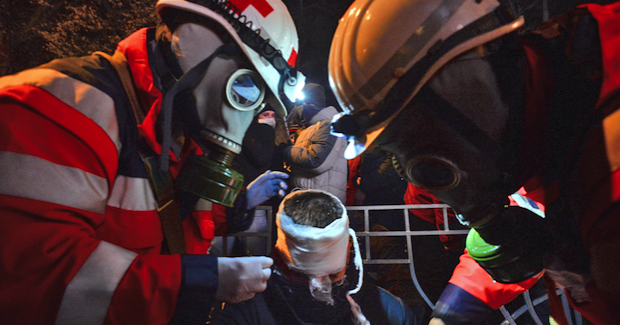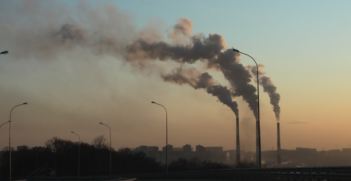Fighting against Chemical Warfare

Chemical weapons have been universally condemned as unconscionable: they target combatants and civilians indiscriminately, leave lasting impressions in the theatres of engagement and psychologically terrorise their potential victims. While their reputation is well established, states and civil society must remain vigilant to ensure their continued condemnation.
A century after the first use of large-scale chemical warfare sparked global outrage during the World War I, it seems inconceivable that people might continue to suffer the horrific consequences of these weapons. And yet, since 2013, the world has been shocked by the persistent use of chemical weapons during the Syrian conflict—beginning with the use of nerve agents in 2013 and continuing with the repeated use of chlorine in 2014 and 2015 and mustard gas in 2015.
These inhumane means of waging war are absolutely prohibited, and any such use constitutes a serious violation of international humanitarian law (IHL). Now, states including Australia are working to address the emerging risks to the prohibition of these weapons.
The ban on chemical warfare is absolute and far-reaching, covering both improvised and classical chemical weapons. The use of weapons that poison or spread disease has been considered unacceptable for centuries—firmly rooted in an age-old taboo that has been passed down for generations in various cultures.
But it was public abhorrence of chemical warfare in the World War I that led to a specific international ban on the use of chemical and biological weapons in 1925. States further strengthened this prohibition with the Biological Weapons Convention in 1972 and the Chemical Weapons Convention (CWC) in 1993. Today, the bans on the use of these weapons are part of customary IHL, which means they apply to all those fighting in all armed conflicts be they states or non-state armed groups. The CWC itself has achieved near-universal status since it entered into force 20 years ago.
We could argue that the legal prohibition has disappointed; that every violation of the law means complete failure. On the contrary, the strength of any norm is tested in the breach; it is tested by how the international community reacts to violations. The broad condemnation of the shocking use of chemical warfare over the past four years attests to the strength of the universal norms banning these weapons. There can no longer be any justification for staying outside the CWC. Now, more than ever, parties such as Australia must push for the five remaining states—North Korea, Egypt, Israel, Palestine and South Sudan—to ratify or accede to it without delay.
However, we must confront the fact that legal prohibitions have not succeeded in eradicating chemical warfare in our time. The international community must remain prepared to deal with the humanitarian consequences of the use of chemical weapons. Unfortunately, the ICRC’s 2007 assessment that there is a lack of international capacity specifically to assist the victims of any use of chemical weapons still stands. States and the relevant international organisations must work to remedy this.
At the same time, states must also address the serious risks posed by the development of highly toxic chemicals that target the central nervous system (CNS)—so called ‘incapacitating chemical agents’—as weapons for law enforcement.
Since 2013, the ICRC has stated that the use of toxic chemicals as weapons for law enforcement purposes should be limited to riot control agents only. The development and use of other toxic chemicals as weapons presents serious risks to life and health—risks that undermine international law prohibiting chemical weapons, and risks that create a slippery slope towards the reintroduction of chemical weapons into armed conflict.
At the 21st Session of the Conference of States Parties to the CWC in December 2016, this issue was taken up by Australia, which led an initiative supported by 35 states, to raise concerns about the use of CNS-acting chemicals as weapons for law enforcement. With the collective goal of preventing the re-emergence of chemical weapons in mind, all states should ensure that national policies and legislation are in place to restrict the use of toxic chemicals as weapons for law enforcement purposes to riot control agents only.
Chemical warfare continues to pose a threat to the lives and dignity of civilians more than 100 years after condemnation prompted states to prohibit such weapons. Legal prohibitions can only be effective when we remain vigilant. It is therefore our duty to work not only for the law to exist, but also for it to be understood, accepted, and respected. The ICRC strongly condemns the use of chemical weapons by any party, anywhere, and appeals to states to be steadfast in their commitment to eliminating chemical weapons, stopping any further use, and preventing their re-emergence.
Netta Goussac is the International Committee of the Red Cross’ regional legal adviser for the Pacific.
This article is part of a series by the International Committee of the Red Cross reflecting on the ongoing serious humanitarian concerns posed by biological, chemical and nuclear weapons.
This article is published under a Creative Commons Licence and may be republished with attribution.





